In injury recovery, peptides for tendon repair have emerged as a promising solution to speed up healing. These short peptides, small chains of amino acids, have shown potential in enhancing regeneration and wound healing.
Tendons, strong connective tissues between muscles and bones, often take a long time to heal when injured. However, peptides for tendon repair offer hope for faster recovery, especially in the early phase of tendon wound healing. Although still for research purposes, the results from studies show significant promise.
Peptides for tendon repair promote the growth of tendon cells and help expand resident TSPC (tendon stem/progenitor cells).
By increasing these crucial cells, they support the healing of Achilles tendon injuries and other damage. These compounds stimulate exogenous growth factors, which play a role in regenerating key proteins like collagen.
Collagen is responsible for repairing fibers and improving their structure. When applied, these molecules enhance cell migration and support the formation of new blood vessels.
These vessels supply nutrients to the healed area, speeding up recovery. Most studies show that this treatment can be given through subcutaneous injections, even at room temperature, for effective absorption.
Peptides are being studied extensively for their ability to stimulate tendon regeneration. Below are the primary peptides that show significant promise in tendon healing:
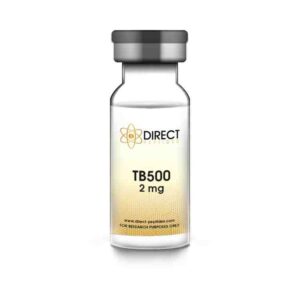 TB500, or Thymosin Beta-4, is one of the most researched peptides in tendon repair.
TB500, or Thymosin Beta-4, is one of the most researched peptides in tendon repair.
This peptide has shown effectiveness in speeding up tendon regeneration, especially in repaired Achilles tendons.
TB500 works by increasing the movement of tendon stem cells and helping create new blood vessels in the damaged area.
Discover how TB500 enhances tissue repair and speeds up recovery. TB500 Category Page – Direct Peptides Europe
This peptide is essential for healing, especially in cases of severe tendon damage.
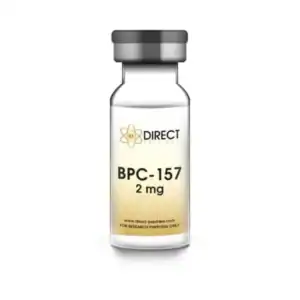 Another compound, BPC-157, also known as Body Protective Compound-157, has shown significant potential in repairing tendons, as evidenced by research published in J Orthop Res.
Another compound, BPC-157, also known as Body Protective Compound-157, has shown significant potential in repairing tendons, as evidenced by research published in J Orthop Res.
Studies have shown its effectiveness in promoting healing of Achilles injuries and acute ruptures.
BPC-157 improves blood circulation, reduces inflammation, and encourages the formation of new cells in the affected area.
Learn how BPC-157 promotes faster healing and tissue regeneration. BPC-157 Category Page – Direct Peptides Europe
IGF-1 LR3, a modified version of Insulin-like Growth Factor-1, helps stimulate the production of human embryonic stem cells, muscle progenitor cells, and mesenchymal stem cells at the injury site.
This peptide enhances muscle regeneration and aids tendon regeneration, leading to faster healing times. It works well for repair, especially in chronic conditions or after a difficult healing process.
See how IGF-1 LR3 boosts muscle and tendon repair for faster recovery. IGF-1 LR3 Category Page – Direct Peptides Europe
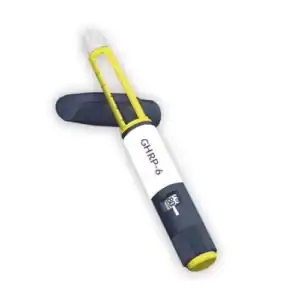 GHRP-6 (Growth Hormone Releasing Peptide-6) stimulates the release of growth hormone, which is key for tendon tissue regeneration.
GHRP-6 (Growth Hormone Releasing Peptide-6) stimulates the release of growth hormone, which is key for tendon tissue regeneration.
The hormone encourages embryonic stem cells to proliferate, especially in tissues such as the tendons.
This peptide plays a crucial role in healing both soft tissues and skeletal muscle regeneration
as highlighted in studies published in the Am J Physiol Cell Physiol.
Find out how GHRP-6 supports tissue regeneration and healing. GHRP-6 Category Page – Direct Peptides Europe
Peptides for tendon repair speed up healing by encouraging stem cells to multiply and controlling inflammatory responses.
They stimulate growth factors and improve cell movement, helping repair tendon fibers faster and reduce scar tissue. Their ability to increase blood flow and enhance vascularization leads to a more efficient healing process.
Tendon injuries, like acute tendon rupture or damage to the human anterior cruciate ligament, are hard to heal. The healing of Achilles tendon ruptures and other acute tendon injuries often take a long time.
The body needs to activate different TSPC populations to help them multiply and repair scar tissue and other types of tissue injury. This process is influenced by factors like initial body weight, which can have a direct impact on the regeneration outcomes.
Peptides are important in this process. They help cells move to the healing region, increase collagen formation, and repair the fiber structure of the injured tendon. This leads to better regeneration outcomes.
For example, TB500 and BPC-157 help stimulate TSPC proliferation and encourage the substantial expansion of resident TSPC. This helps improve tendon repair and reduces complications like the infiltration of inflammatory cells.
As peptides guide the direction of traction during recovery, they help build strength and flexibility. By supporting drug administration and improving healed tendon quality, peptides contribute to faster healing of the injured area.
Explore Peptide Supplies at Direct Peptides Europe for all your reconstitution requirements.
BPC-157 plays a broader role beyond tendon repair. It enhances the healing of various tissues, including soft tissues, skeletal muscles, and even corneal epithelial wounds, as shown in studies by Ho TC and colleagues.
BPC-157, known as a “body protection compound,” works by stimulating hepatic stem cells and supporting embryonic stem cells in regenerating tissues. This is especially useful for injuries. It also works well with hydrogel combinations of fibroblast growth factor, improving tissue recovery.
The healing process in tendons involves stimulating the proliferation of tendon stem cells and the regeneration of important structural proteins, which can be a relatively difficult process in the tendon healing process.
Peptides for tendon repair support this process by promoting cell movement, collagen formation, and improved tendon tissue regeneration.
This promising approach, using early-stage application of peptides, significantly impacts the anatomical analysis of TSPC populations, ensuring faster recovery and reducing scar tissue formation.
In the early phase of wound healing, peptides stimulate the proliferation of stem cells, speeding up the healing process. By increasing the number of cells at the injury site, these peptides promote better outcomes, especially when given through subcutaneous injections.
Studies have shown that peptides increase the regeneration of tissue, allowing for better recovery and more effective healing.
Although the results of peptides for tendon repair are promising, their use remains limited to research. Since peptides are still being evaluated, side effects are not fully understood.
It’s important to note that peptides like TB500 and BPC-157 are not approved for human use yet. Further histological data and anatomical analysis of TSPC populations are needed to confirm their safety and effectiveness.
Research on peptides for tendon repair is ongoing, and side effects are still being studied. While some peptides may help with weight loss, enhance gut health, or improve tendon healing, they can also lead to potential issues, such as low proliferative response in certain individuals.
More further studies are needed to assess how these peptides impact overall health and their potential side effects.
Peptides for tendon repair represent a groundbreaking advancement in tissue repair and healing. Research shows that TB500, BPC-157, IGF-1 LR3, and GHRP-6 are effective in improving regeneration, enhancing cell proliferation, and promoting faster recovery.
Though they are not yet approved for human use, their success in animal models gives a glimpse into the future of tendon repair.
[1] Maar K, Hetenyi R, Maar S, Faskerti G, Hanna D, Lippai B, Takatsy A, Bock-Marquette I. Utilizing Developmentally Essential Secreted Peptides Such as Thymosin Beta-4 to Remind the Adult Organs of Their Embryonic State-New Directions in Anti-Aging Regenerative Therapies. Cells. 2021 May 28;10(6):1343
[2] Shrivastava S, Srivastava D, Olson EN, DiMaio JM, Bock-Marquette I. Thymosin beta4 and cardiac repair. Ann N Y Acad Sci. 2010 Apr;1194:87-96.
[3] Xiong Y, Mahmood A, Meng Y, Zhang Y, Zhang ZG, Morris DC, Chopp M. Neuroprotective and neurorestorative effects of thymosin β4 treatment following experimental traumatic brain injury. Ann N Y Acad Sci. 2012 Oct;1270:51-8.
[4] Chang CH, Tsai WC, Lin MS, Hsu YH, Pang JH. The promoting effect of pentadecapeptide BPC 157 on tendon healing involves tendon outgrowth, cell survival, and cell migration. J Appl Physiol (1985). 2011 Mar;110(3):774-80.
[5] Teng CF, Jeng LB, Shyu WC. Role of Insulin-like Growth Factor 1 Receptor Signaling in Stem Cell Stemness and Therapeutic Efficacy. Cell Transplant. 2018 Sep;27(9):1313-1319.
[6] Lei T, Buchfelder M, Fahlbusch R, Adams EF. Growth hormone releasing peptide (GHRP-6) stimulates phosphatidylinositol (PI) turnover in human pituitary somatotroph cells. J Mol Endocrinol. 1995 Feb;14(1):135-8.
Shop ALL Peptide Vials from Direct Peptides Europe today, your trusted supplier of premium clinical grade peptides online.

TWIN PACKS
BPC-157 Peptide Vial
£11.46 – £61.88Price range: £11.46 through £61.88 Select options This product has multiple variants. The options may be chosen on the product page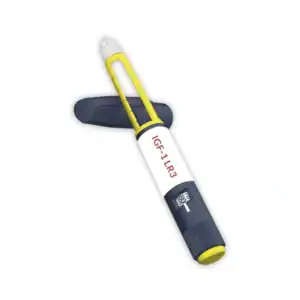
IGF-1 LR3 Pre-Mixed Pen 1mg
£81.99 – £221.36Price range: £81.99 through £221.36 Select options This product has multiple variants. The options may be chosen on the product page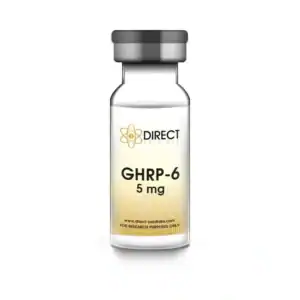
GHRP-6
£12.54 – £28.82Price range: £12.54 through £28.82 Select options This product has multiple variants. The options may be chosen on the product page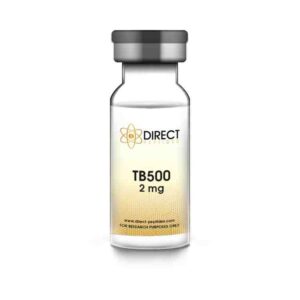
BULK BUY
BULK BUY
BULK BUY
BULK BUY
TB500 Peptide Vial
£13.70 – £93.85Price range: £13.70 through £93.85 Select options This product has multiple variants. The options may be chosen on the product pageALL CONTENT AND PRODUCT INFORMATION AVAILABLE ON THIS WEBSITE IS FOR EDUCATIONAL PURPOSES ONLY.
DISCLAIMER: These products are intended solely as a research chemical only. This classification allows for their use only for research development and laboratory studies. The information available on our Europe Direct Peptides website: https://direct-peptides.com is provided for educational purposes only. These products are not for human or animal use or consumption in any manner. Handling of these products should be limited to suitably qualified professionals. They are not to be classified as a drug, food, cosmetic, or medicinal product and must not be mislabelled or used as such.